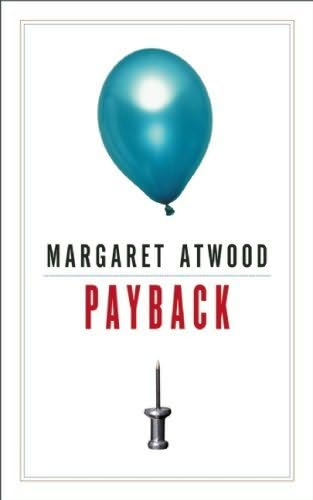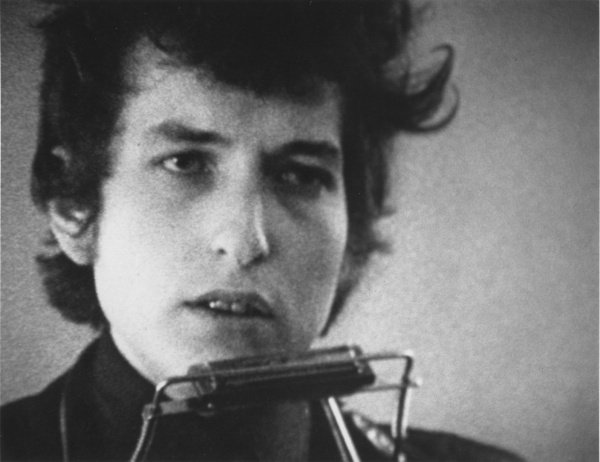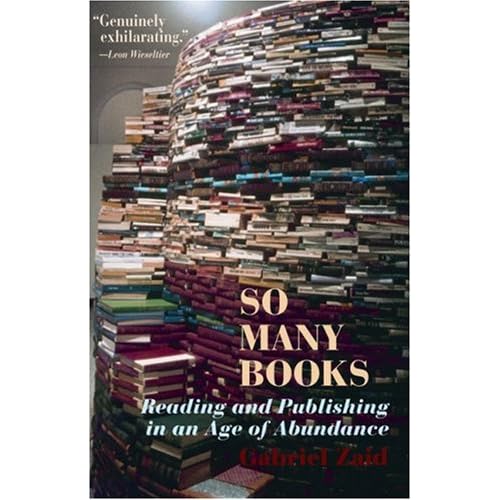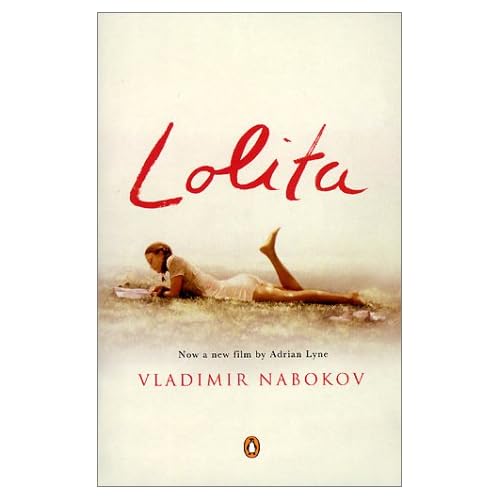Just a few observations about the Vice Presidential debate last night, while it's still fresh in my mind. I'll use my
Twitter feed as a reference, since I was forced to post certain comments during the debate and didn't want to run to the computer.
 Photo from the NY Times.Overall
Photo from the NY Times.OverallFor the American voters already with a voting choice in their mind, I don't think this debate had much of an impact. Both candidates were strong in their own respect and neither visibly faltered. Even for voters who are decided but are somewhat on the fence, I still don't think this debate could have swung the vote over to the other side.
For the average,
undecided voters, I also think this was a sort of toss up. I think average
American Joe Six-Pack (we'll say a person with some college education but no degrees) will have recognized Palin's efforts to dodge questions and revert to spewing out unrelated information for any question she did not want to answer. But I also think the average American will have been confused by Joe Biden's rhetoric at times -- I mean, he did talk about a lot of issues, a lot of constitutional stuff. One time he listed like three or four Middle Eastern regions/topics in rapid succession. A lot of average Americans aren't going to know what he was talking about some of the time.
Biden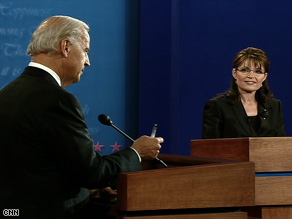 Photo from CNN.
Photo from CNN.I'm going to start with Biden, because I think for Americans with moderate to high levels of education behind them (let's say a bachelor's degree and up), he was the outright winner. Anyone who gives a
shit about the rules of a formal debate recognizes Biden's efforts to
answer every single question directly. He was amazing in this respect -- I had
never seen a politician promptly address every topic through at him. The only question he may have sidestepped, which, coincidentally, was the dumbest question of the night, was:
Probably the biggest cliche about the vice-presidency is that it's a heartbeat away, everybody's waiting to see what would happen if the worst happened. How would -- you disagree on some things from your principles, you [Palin] disagree on drilling in Alaska, the National Wildlife Refuge, you [Biden] disagree on the surveillance law, at least you have in the past. How would a Biden administration be different from an Obama administration if that were to happen.
I mean, it was blatantly obvious that this was a question for Palin. And even though it's a very relevant topic, the framing of this question -- how would you differ from your running mate if he died and you had to take helm -- is just so easily sidestepped by reiterating talking points about their campaign. From what I remember, Biden answered everything else. The ones that stand out in my mind as being exceptionally handled were the ones about his
Achilles' Heel and the one about what sort of things he had to change in his views since he began holding office (both of which Palin rather clumsily side-stepped).
Biden also kept a serious, formal tone, only joining in with Palin's joking on one occasion.
Palin Photo from the London Times Online.
Photo from the London Times Online.Alright, I have to give it to the gal -- she did relatively well. She didn't falter at any time (unless you consider side-stepping half the questions "faltering"), and she threw out a few jabs, cracked a few jokes, gave us the "straight talk" and talked about her "Team of Mavericks" (which I want to adopt as a new name for our cover band). She appealed to the average American, and she looked good -- had good poise, kept her cool, and was always ready with a response, even though most of the time it had no relevance whatsoever to the current discussion point. But I guess the average American doesn't care about that anyway. So she did pretty well for the audience she was targeting.
BUT...She dropped the ball when she said that she only been at this whole Washington thing for five weeks and hadn't really promised anything yet. So, yeah, I mean, we can't hold you against your word if you don't have any.
Again when she said that Biden "made it clear that [she] was an outsider to Washington". C'mon Palin. We know where you're going with this, but even I felt bad for her after that one.
She insisted that we not point fingers back at the Bush administration (e.g., history), although she went on to exalt Ronald Reagan and basically align McCain/Palin with Reagan.
She diverted nearly every discussion to talk about strong things in her campaign notes. She almost never answered a question directly. She attacked Biden and Obama more and more fiercely than Biden would. Which is good for her because she's seen as a feisty Maverick (team of mavericks!), but Biden just stood there and straight-up refuted every single attack she put out with simple facts.
(Paraphrases)
"Obama voted against funding the troops."
"... McCain voted the exact same way on that measure."
"Obama voted 94 times to raise taxes."
"... That's a faulty measure, but if we're using it, then McCain voted 207 times to raise taxes."
"I'm an outsider Maverick to Washington and you're old and have lots of experience."
"Thank you."
My Favorite MomentsMy second-favorite moment of the night was one of the only times Biden challenged/attacked Palin on something. After she gave one of her spiels about being a hockey mom, he came back with "I didn't hear a single policy change from Bush's Middle East policies and McCain's." WHOA. Slow down, Joe! But, I mean, he just railed her on that point -- Obama/Biden have definitive, key differences in their approaches to certain Middle East countries, and McCain/Palin haven't formulated a
single difference in their proposed approaches to any of those situations. And Palin didn't outright argue with his point. Personally, I want some people who will really
change things if they don't work, and this excuse that McCain just "hasn't formulated a plan yet" doesn't come off too hot either.
But my most favorite moment of the night, by far, was when Palin threw out some shit about being a hockey mom from middle class America, sitting around the table wondering how they will pay for health insurance, and how she has a special needs child, and whatever.
Biden comes back with his stories of his family: how his father left, and how his wife and daughter died, and how he didn't know what to think about the future for his children. He became
genuinely emotional (I honestly believe he wasn't faking that) and choked up about his response, and they cut:
"Governor Palin?"
And SHE IS FLOORED. She has no response to that. So she's looking down at her notes, then she slowly raises her face, puts on her best shit-eater's grin, and spits some shit about how McCain is a maverick.
My honorable mentions are when Joe Biden referred to himself in third person.
"NOT JOE BIDEN."
Awesome.
ConclusionsEven though Biden technically won the debate by answering all the questions and all, I fear that Biden and Obama are still looking too professorial (someone used this word in their description of Obama and I think it fits). Ultimately, it might come down to:
"Well, do I want to vote for someone who knows a lot more than I do about complicated issues, and one who can discuss them intelligently... or do I want someone whom I can relate to, who was a mom in middle America and who will cater to my needs (even though she won't)?"
Man, I hope people recognize this time around that we need professional leaders who know a lot more than we do. And, to end: personally, I would vote for four more years of George W. Bush if Palin even has the remotest possibility of becoming our president. The prospect genuinely scares me on a daily basis.



